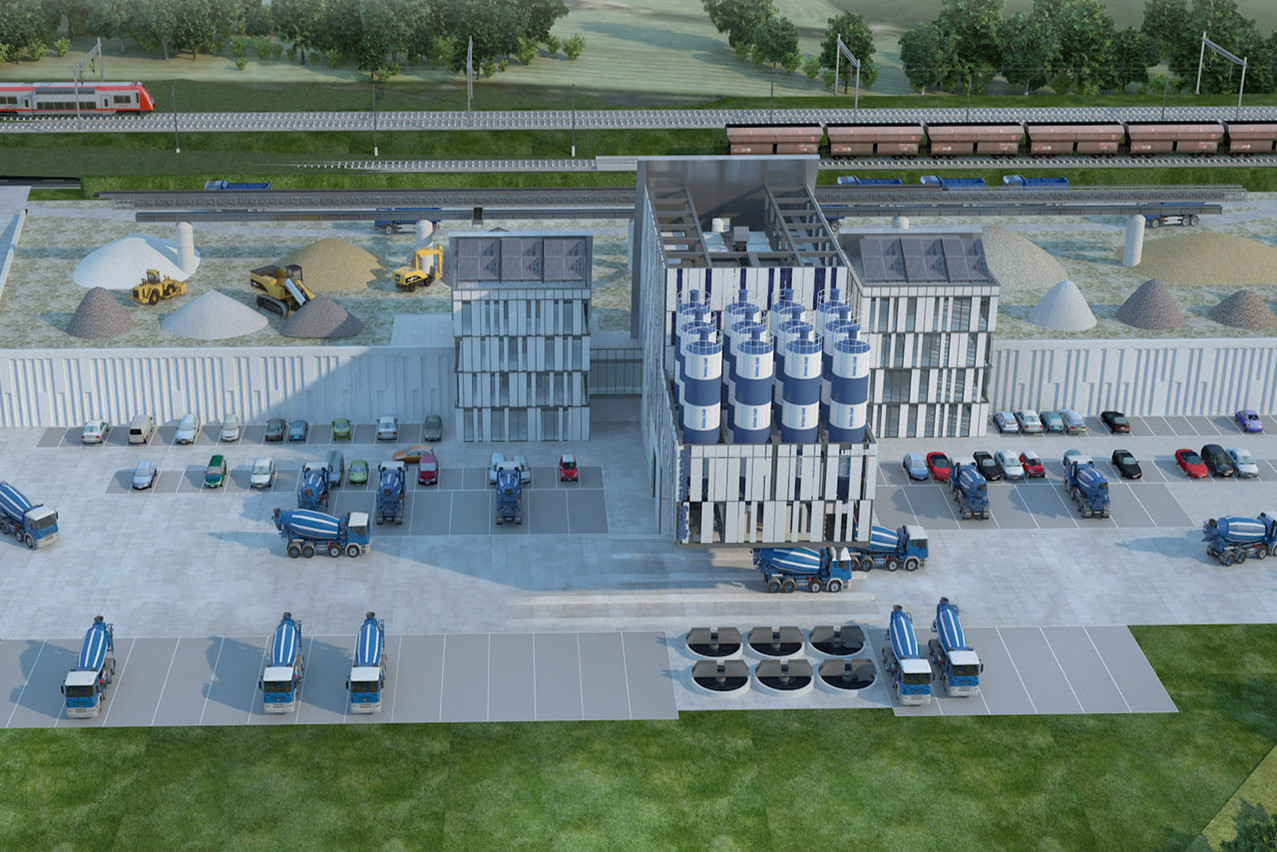As you pass along Rue des Scillas, it’s hard not to understand Bétons Feidt’s impatience to leave its current site at Howald. The tram passes by, but the road is still under construction. Blue and white lorries have been coming and going from the site since early morning.
A huge mural on its mechanical workshop reads “Bétons Feidt is leaving Howald by 2026.” At least, that’s what Ferd Feidt, the company’s CEO and son of one of its founders, is still hoping for. “We agreed with the authorities in 2015, given the development of Luxembourg City and the Midfield district around the Boulevard des Scillas, that a building materials industry such as Bétons Feidt would no longer have a place in Howald,” recalls the CEO.
Discussions between the company and the authorities led to a new location being chosen for Bétons Feidt’s activities: in Cessange, “between the Esch and Arlon motorways, to avoid noise pollution and to ensure excellent access to the motorway network in the near future. We bought the land in 2015,” explains Feidt. Since then, the company has been looking forward to the move. Not because it doesn’t like its historic site any more, but because the company has ambitions to go even further in the production of recycled concrete, as the CEO explained .
Our cities are becoming the quarries of the future.
“This new site will enable the company to relocate its current production while adding a recycling platform with associated facilities, which will provide aggregates for our sustainable concrete production. With the general awareness that natural deposits are limited and that materials from deconstruction and reconstruction need to enter the circular economy circuit, our cities are becoming the quarries of the future!” explains Feidt, who adds that “the new production plant will be part of a policy to minimise the carbon footprint as much as possible. It will, for example, be equipped with a photovoltaic system.”
As for the location, Bétons Feidt says it wants to ensure that the urban development of modern cities incorporates the circular economy into its fabric. Recycling centres, and therefore material recovery centres, must be close to built-up areas. “We need to avoid lorry tourism for materials to be recycled, linked to construction,” stresses the CEO.
The future Bétons Feidt site at Cessange should eventually benefit from a connection to the future Merl and Cessange bypasses. This new route, presented for the first time as part of the Route 2020 study by the National Roads Administration (Ponts et Chaussées), is intended to serve the new business and residential areas in the southwest of the city of Luxembourg. In the meantime, the reprofiling of the CFL underpass at PK 17.021 will enable Feidt lorries to access the motorway network via the Merl roundabout on the A4, thus avoiding the need to pass through the Cessange and Leudelange districts. A connection to the rail network is also planned.
On the Boulevard des Scillas, Bétons Feidt played along by agreeing to cut its mechanical workshop in half to allow for the construction and passage of the tramway, without obstructing traffic. The workshop was “cut to size” to make room for the traffic lanes and the tramway.

The CEO poses in front of a fresco created to mark the arrival of the tram, for which the company had to cut its mechanical workshop in half. Photo: Maëlle Hamma/Maison Moderne
But today, for its part, the Feidt company is still waiting for its activities to be relocated... “The southwest study on the development of Hollerich, Cessange and Merl is still ongoing. As long as it is not completed, it is very difficult to definitively establish the project. And in a way, Bétons Feidt is the big loser because we are still not on our new site,” regrets Ferd Feidt.
He also points to another phenomenon: the growing demand for sustainable materials on public and private sites. “Not to mention the fact that all this is once again part of this idea of corporate social responsibility, and that we have to face up to the fact that international investors will also be increasingly demanding about the sustainability of buildings. Our industry needs to be able to offer these solutions,” says the CEO, who hopes to be based in Cessange within the next two years. “Every day, we miss our objective of doing things as ecologically and consistently as possible. We need to be relocated as soon as possible.”
When asked about the urban development study mentioned by Ferd Feidt, Luxembourg City Council replied that “the proposed site raises a number of questions about its accessibility. The first thing to do, therefore, is to examine the framework conditions which, if they are met, will make it possible to launch the urban development study for this part of the city.”
This article was originally published in .

